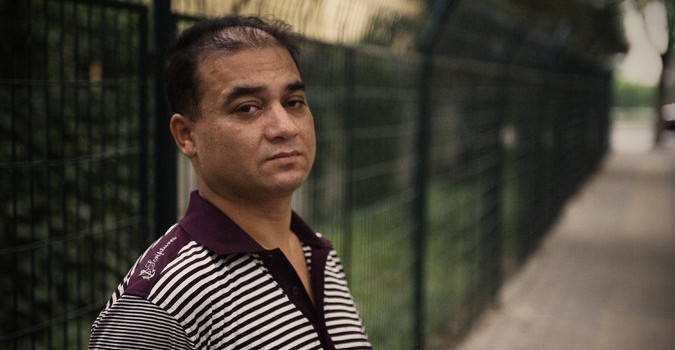The European Parliament has named jailed Uyghur scholar Ilham Tohti as a finalist for a key human rights award in 2016, for “exceptional individuals and organisations defending human rights and fundamental freedoms.”
Tohti, a former professor at the Central University for Nationalities in Beijing, was sentenced to life in prison following his conviction on a charge of “separatism” by the Urumqi Intermediate People’s Court in Xinjiang on Sept. 23, 2014.
He was nominated for the Sakharov Prize by EU lawmaker Ilhan Kyuchyuk and 42 colleagues, the Parliament said in a statement on its official website.
Beijing rights activist Hu Jia said Ilham Tohti, a member of the mostly Muslim, Turkic-speaking Uyghur ethnic group, was a clear contender for the award.
“He is the enlightened voice of the Uyghur people and a thorn in the side of the [ruling] Chinese Communist Party,” said Hu, who won the Sakharov Prize in 2008. “He also received the heaviest sentence [of recent activists].”
“The ethnic group that he represents has been enslaved, suppressed, and excluded, which has resulted in a lot of hate and violence,” he said.
Pressure on China
Hu said the value of the Sakharov Prize for Chinese dissidents lies in the fact that potential winners are nominated by directly elected lawmakers who represent “European values.”
“This will put a huge amount of pressure on the Chinese government,” he said.
World Uyghur Congress spokesman Dilxat Raxit welcomed the nomination, saying that it sent a clear message that Ilham Tohti is a prisoner of conscience, and not guilty of the charges against him.
“Ilham Tohti was handed a harsh prison sentence for his advocacy of mutual understanding, tolerance, and dialogue between the Uyghurs and the Han Chinese,” Raxit told RFA.
“That’s why 43 MEPs entered his name as the last of the nominees to make the shortlist,” he said.
“This shows that the European Union and the international community have recognized the direct connection between violent incidents in Uyghur lands … and the discriminatory and aggressive policies implemented by the Chinese government,” Raxit said.
A better understanding
Speaking to RFA’s Uyghur Service following the announcement, Ilham Tohti Initiative members Enwer Jan and Marie Holzman welcomed the Parliament’s decision, saying the nomination shines a light on the Uyghur people’s suffering under Chinese rule.
“Although he is now in jail, I congratulate Ilham Tohti on his nomination,” Jan, a Uyghur activist, said.
“I see this nomination as a recognition by the international community of the Uyghur people’s suffering and the justice of their cause, and I congratulate the Uyghur people as well.”
“We do not see this nomination as the final victory,” Holzman said, adding, “[A decision] will be revealed at the end of this month.”
“But honestly speaking, we consider the nomination a success as well.”
“What makes us happy is that, because of Ilham Tohti’s nomination for this prize, the members of the European Parliament have begun to promote an understanding of who Ilham Tohti is, what he did, and who the Uyghurs are,” she said.
“A tremendous amount of work lies ahead of us.”
‘Scapegoat’
Associate professor Elliot Sperling of Bloomington University’s department of Central Eurasian Studies said Ilham Tohti’s nomination recognized that he had been made a “scapegoat” by the Chinese government for tensions in the troubled northwestern region of Xinjiang.
Amid a growing climate of arrests and “disappearances” in the wake of violent unrest in the Xinjiang capital Urumqi in 2009, Ilham Tohti had planned to spend time as a visiting scholar in Sperling’s department at Bloomington, Indiana.
But he was detained as he tried to leave China to take up the post in early 2013, and was formally arrested on Jan. 15, 2014 and charged with separatism. His subsequent trial and sentence prompted a wave of international protests and petitions for his release.
China has been keen to portray its Uyghur population as potential terrorists after a wave of violent incidents hit Xinjiang following a police crackdown on a peaceful demonstration in the regional capital, Urumqi, in July 2009.
Fellow nominees for the Sakharov Prize for Freedom of Thought include Turkish journalist Can Dündar and colleagues, the Crimean Tatar leader Mustafa Dzemilev, and Yazidi ISIS survivors and public advocates Nadia Murad Basee and Lamiya Aji Bashar.
The winner will be selected on Oct. 6 after the nominees are presented to committees dealing with foreign affairs, development, and human rights, with the prize announced on Oct. 27, it said.
Source: rfa.org

Leave a Reply